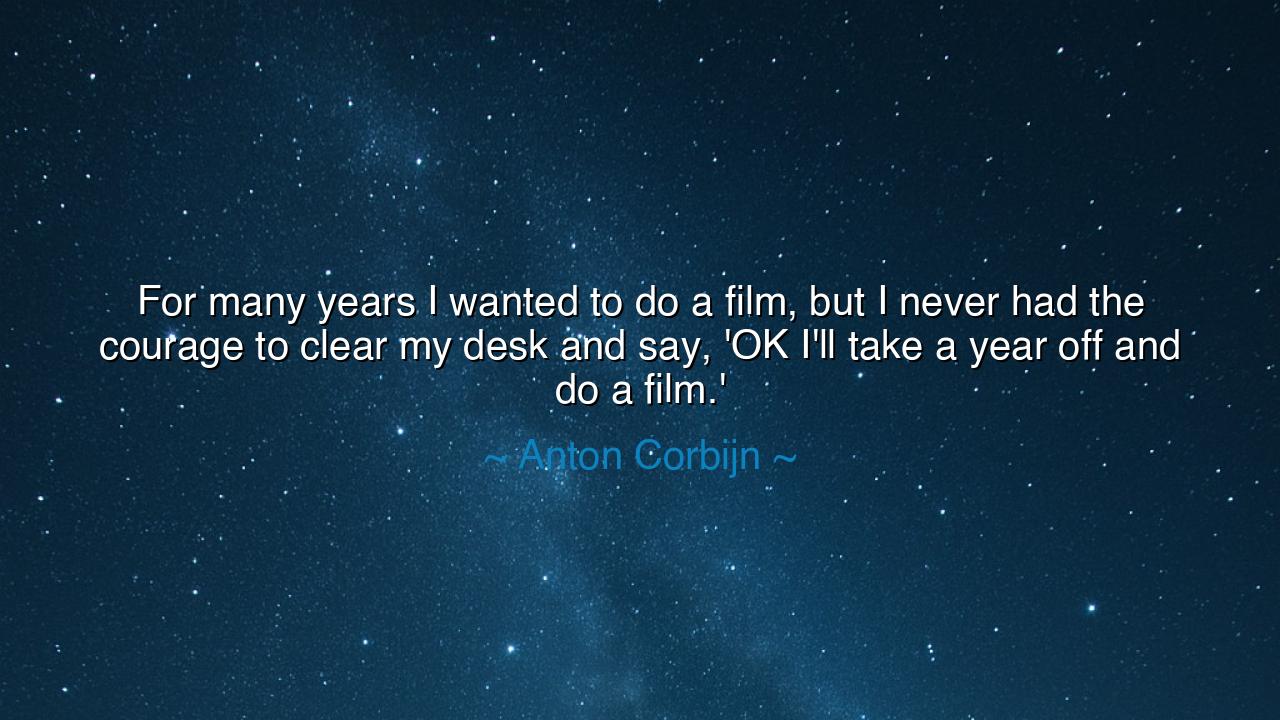
For many years I wanted to do a film, but I never had the courage
For many years I wanted to do a film, but I never had the courage to clear my desk and say, 'OK I'll take a year off and do a film.'






“For many years I wanted to do a film, but I never had the courage to clear my desk and say, ‘OK, I’ll take a year off and do a film.’” — Thus spoke Anton Corbijn, the Dutch photographer and filmmaker whose artistry has long captured the soul of music and image alike. His words are not merely about cinema; they are about fear, hesitation, and the price of unfulfilled longing. In this confession, Corbijn reveals the quiet struggle that lives in every human heart — the tension between the safety of routine and the leap toward one’s true calling. His reflection stands as both lament and lesson: that dreams demand sacrifice, and that courage is not born in the absence of fear, but in the will to act despite it.
Corbijn’s life was one of artistry in many forms. He began as a photographer, immortalizing the spirit of rock legends like U2 and Joy Division through stark, haunting images. His eye was attuned to emotion, his craft already masterful. Yet within him stirred another longing — to create in motion, to give breath and time to the images that lived in his imagination. Still, he remained bound to his familiar work, to the “desk” of security and recognition. The desk, in his words, becomes a symbol of comfort — that invisible barrier which traps the artist in what is known, keeping him from what is possible. For years, he sat before it, yearning to step away, yet lacking the courage to face the uncertainty that follows every act of creation.
There is something profoundly human in this admission. How many souls live as Corbijn once did — surrounded by the tools of their trade, yet haunted by the voice of what might be? The ancients understood this paralysis of the heart. The Greek poet Hesiod warned that the greatest obstacle to greatness is not ignorance, but delay — the waiting for a perfect moment that never comes. Corbijn’s struggle echoes this timeless truth: that the pursuit of any noble work demands the willingness to let go, to clear the desk, to abandon certainty for the uncharted realm of possibility.
Consider the story of Michelangelo, who hesitated for years before accepting the commission to paint the Sistine Chapel. Though already a renowned sculptor, he doubted his ability to work on such a vast canvas. The thought of failure shadowed his ambition. Yet, when he finally yielded to the call, his brush gave birth to one of the world’s most enduring masterpieces. Like Corbijn, Michelangelo had to lay aside the familiar — the chisel for the brush, the comfort of mastery for the challenge of the unknown. In both men’s stories lies the same truth: creation demands abandonment, and the path to greatness is paved with acts of deliberate courage.
Corbijn’s phrase “take a year off” holds profound symbolic weight. It is not merely about time, but about commitment — the conscious choice to dedicate oneself wholly to a vision. In a world that prizes productivity and continuity, to pause one’s routine for a dream feels reckless, even foolish. Yet such pauses are the crucibles in which transformation occurs. The act of clearing one’s desk is an act of faith — faith that the unknown holds something greater than the comfort of the known. For only by making space can new creation be born. The farmer must plow the soil before sowing seed; the artist must empty his schedule before filling the world with beauty.
Yet courage, as Corbijn’s words reveal, does not arrive easily. It must be summoned, often after long years of hesitation. Fear of failure, of wasted effort, of the judgment of others — these are the invisible chains that hold the soul captive. But the wise know that there is a greater fear still: the fear of a life unlived, of a dream forever deferred. In the silence between desire and decision lies the measure of one’s spirit. Corbijn’s eventual choice — to make his first film, Control, about the life and death of Ian Curtis — stands as a victory of will over inertia. From that act of courage, his artistic vision found new life, proving that even delayed bravery can bear timeless fruit.
The lesson, then, is clear: the desk must be cleared, the leap must be made. Every person who dreams must face their own moment of decision — to remain within the safety of the known or to risk everything for the creation that calls to them. Do not wait for courage to come; it is born in motion. The first step away from comfort is the beginning of freedom. If you feel the pull of a long-denied dream, honor it. Step away from your desk, your habits, your fear. In that act, you will discover what Corbijn discovered — that courage, once awakened, opens the door to the deepest form of happiness: the joy of living in alignment with one’s true purpose.
So remember, my child: the greatest masterpieces are not born from perfect conditions, but from imperfect souls who dared to begin. The desk before you is not your prison unless you let it be. Clear it. Step into the unknown. For beyond hesitation lies creation, and beyond fear lies freedom. And in that freedom — as Corbijn learned — lies the purest joy a human heart can know: the joy of becoming what it was always meant to be.






AAdministratorAdministrator
Welcome, honored guests. Please leave a comment, we will respond soon